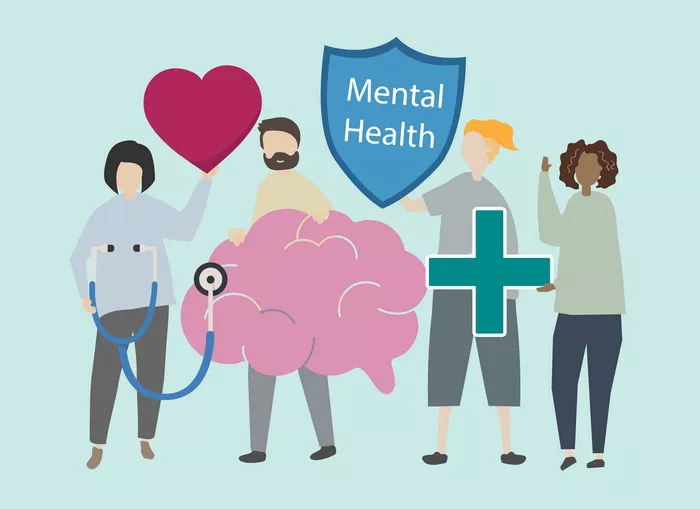In the realm of mental health, misconceptions and misunderstandings abound, perpetuating stigma and hindering progress in treatment and support. Despite advances in research and awareness, societal attitudes towards mental illness remain fraught with stereotypes and misinformation. In this thought-provoking article, we confront the misconceptions and myths surrounding mental illness, challenging preconceived notions and advocating for a more compassionate and informed approach.
The Complexity of Mental Illness: Dispelling Myths
Mental illness encompasses a broad spectrum of conditions that affect mood, behavior, and cognition, ranging from anxiety and depression to schizophrenia and bipolar disorder. Yet, despite its prevalence and impact on individuals and society, mental illness continues to be shrouded in stigma and misunderstanding. Let us address some of the common myths and misconceptions that perpetuate harmful stereotypes and hinder progress in mental health advocacy:
1. Myth: Mental illness is a sign of weakness or personal failure
One of the most pervasive myths surrounding mental illness is the notion that it is a sign of weakness or personal failure. This harmful belief undermines the complexity of mental health conditions, which often arise from a combination of genetic, biological, environmental, and psychological factors. Mental illness is not a choice, nor is it indicative of a lack of resilience or willpower. Just as individuals can develop physical health problems despite leading healthy lifestyles, mental illness can affect anyone, regardless of their strength or character.
2. Myth: Mental illness is rare or uncommon
Contrary to popular belief, mental illness is not rare or uncommon. In fact, it affects millions of people worldwide, spanning all ages, backgrounds, and demographics. According to the World Health Organization (WHO), an estimated one in four people will experience a mental health condition at some point in their lives. Despite its prevalence, mental illness is often misunderstood and overlooked, leading to inadequate support and resources for those in need.
3. Myth: Mental illness is solely a result of personal trauma or upbringing
While adverse experiences and environmental factors can contribute to the development of mental illness, they are not the sole determinants. Genetic predisposition, brain chemistry, and neurobiological factors also play significant roles in the onset and progression of mental health conditions. Mental illness is a complex interplay of biological, psychological, and social factors, and attributing it solely to personal trauma or upbringing oversimplifies the issue and perpetuates stigma.
4. Myth: People with mental illness are violent or dangerous
Perhaps one of the most harmful myths surrounding mental illness is the stereotype that individuals with mental health conditions are inherently violent or dangerous. In reality, the vast majority of people with mental illness are not violent, and they are more likely to be victims of violence than perpetrators. Sensationalized media portrayals and misconceptions fuel this misconception, leading to fear, discrimination, and social exclusion for those living with mental illness.
5. Myth: Mental illness is a choice, and people can simply “snap out of it”
Another prevalent myth is the belief that mental illness is a choice and that individuals can simply “snap out of it” if they try hard enough. This harmful misconception trivializes the experiences of those living with mental health conditions, overlooking the complex interplay of biological, psychological, and social factors that contribute to their struggles. Mental illness is not a matter of willpower or attitude adjustment; it requires understanding, empathy, and appropriate support.
Redefining Mental Illness: A Call for Compassion and Understanding
To combat the stigma and misconceptions surrounding mental illness, we must challenge outdated beliefs and foster a culture of compassion and understanding. Here are some key principles to guide our approach to mental health:
1. Recognize the complexity of mental illness
Mental illness is not a one-size-fits-all condition; it is complex and multifaceted, influenced by a wide range of factors. By acknowledging the complexity of mental health conditions, we can move away from simplistic explanations and embrace a more nuanced understanding of human behavior and experience.
2. Challenge stereotypes and stigma
Stigma surrounding mental illness persists due to stereotypes and misconceptions. By challenging these stereotypes and speaking out against stigma, we can create a more inclusive and supportive environment for those living with mental health conditions. Educating ourselves and others about the realities of mental illness is crucial in dismantling stigma and promoting acceptance.
3. Promote empathy and compassion
Empathy and compassion are essential in supporting individuals living with mental illness. By listening without judgment, offering support and understanding, and validating their experiences, we can help reduce feelings of isolation and alienation. Treating others with kindness and respect, regardless of their mental health status, fosters a sense of belonging and community.
4. Advocate for accessible and equitable mental health care
Access to mental health care is essential for those living with mental illness to receive the support and treatment they need. Advocating for accessible and equitable mental health services, including counseling, therapy, and medication, helps ensure that everyone has access to the resources they need to thrive. Additionally, supporting policies and initiatives that prioritize mental health awareness and education can help reduce barriers to care and promote well-being for all.
Conclusion: A New Narrative for Mental Health
In conclusion, it’s time to rewrite the narrative surrounding mental illness, challenging misconceptions and myths and embracing a more compassionate and understanding approach. By recognizing the complexity of mental health conditions, challenging stereotypes and stigma, promoting empathy and compassion, and advocating for accessible and equitable care, we can create a world where mental health is treated with the same importance and dignity as physical health.
Let us strive to educate ourselves and others, to listen without judgment, and to support those living with mental illness with empathy and understanding. Together, we can break down barriers, promote acceptance, and build a more inclusive society where everyone has the opportunity to thrive.
[inline_related_posts title=”You Might Be Interested In” title_align=”left” style=”list” number=”6″ align=”none” ids=”7287,7284,7281″ by=”categories” orderby=”rand” order=”DESC” hide_thumb=”no” thumb_right=”no” views=”no” date=”yes” grid_columns=”2″ post_type=”” tax=””]































